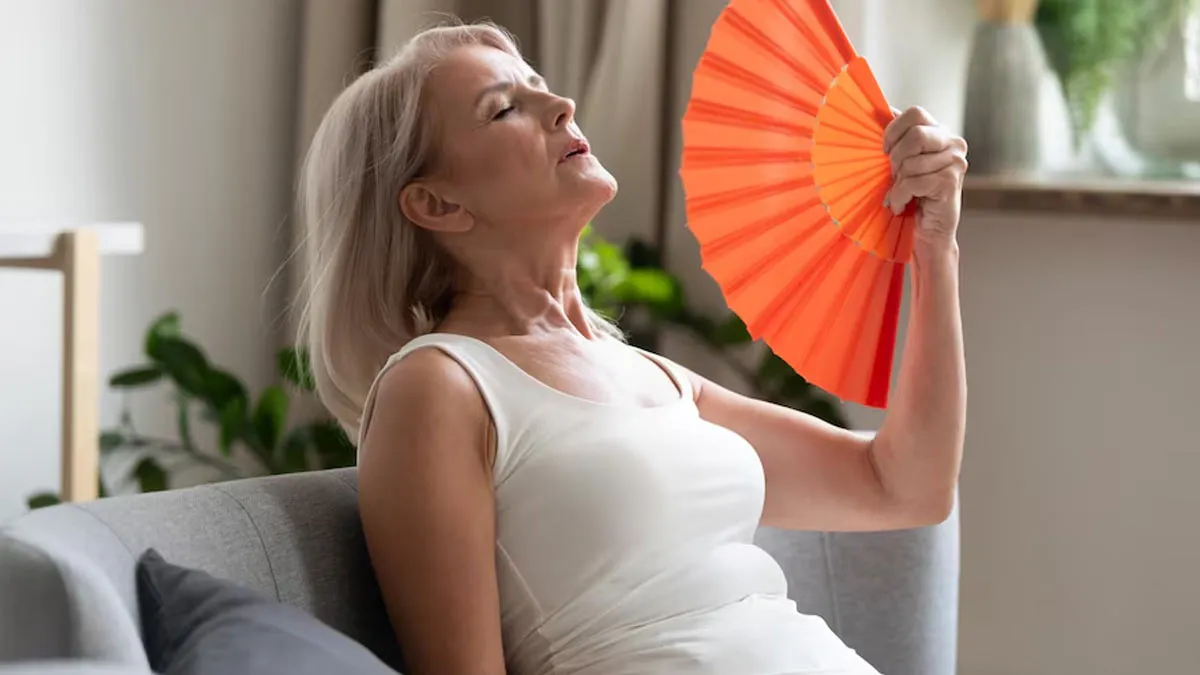
Hot flashes, or a feeling of sudden heat running through the body, are a common symptom of menopause. Menopause refers to the time when the menstrual cycle comes to an end permanently, and women can no longer get pregnant. During this time, the levels of hormones like oestrogen and progesterone also decrease, which can cause symptoms like mood swings, vaginal dryness, low libido, and hot flashes.
Table of Content:-
In some menopausal women, nighttime hot flashes are extremely common, which can disrupt sleep and also cause a lot of discomfort. Unfortunately, you can’t completely prevent hot flashes, but you can manage them with lifestyle changes, home remedies, and certain therapies and medications. Read to know all the specifics.
Also Read: Foods That Can Trigger Hot Flashes During Menopause
What Causes Nighttime Hot Flashes During Menopause?

According to Dr Archana Dhawan Bajaj, Gynaecologist, Obstetrician, and IVF expert, Nurture IVF Clinic, New Delhi, hormonal changes during menopause usually cause hot flashes. While it's not quite known how hormonal changes trigger hot flashes, most research indicates that they occur when low oestrogen levels lead your body's thermostat, also called the hypothalamus, to become more sensitive to minor temperature fluctuations, explains Dr Bajaj. So, when the hypothalamus detects that your body is overheating, it initiates a series of events known as a hot flash to cool you down.
There could be other probable causes too, including drug adverse effects, thyroid issues, certain malignancies, and cancer therapy side effects.
How To Manage Nighttime Hot Flashes During Menopause

Hot flashes can occur at night and can be more pronounced during this time, making it difficult to sleep or relax. Over time, if the problem continues and if it is left untreated, it can lead to serious sleep disorders. To manage nighttime hot flashes, here’s what the doctor recommends:
- Dress with layers that may be removed as soon as a hot flash occurs.
- Carry a handheld fan to use when a heat flash occurs.
- Avoid alcoholic beverages, spicy meals, and caffeine; these can exacerbate menopausal symptoms.
- If you smoke, attempt to quit, not just to avoid hot flashes but also for your general health.
- Try to keep a healthy weight; women who are overweight or obese may have more frequent and severe hot flashes.
- Discover mind-body techniques; some preliminary study suggests that hypnotherapy and mindfulness meditation might help regulate hot flashes.
Can Hormone Replacement Therapy (HRT) Help?
Hormonal/oestrogen treatment is most effective for reducing menopausal hot flashes, says Dr Bajaj, adding that it also relieves other menopausal symptoms and decreases bone loss risk.
HRT is a treatment that can help women manage their menopause symptoms effectively. It works towards restoring the oestrogen and progesterone levels in the body, which are lost during the menopausal stages.
A studypublished in the Canadian Medical Association Journal refers to menopausal hormone therapy as the "first-line treatment of vasomotor symptoms" and a safe treatment option for women with no risk factors.
Researchers also point towards the Women's Health Initiative (WHI) trial that shed light on the risks and benefits of HRT. The study looked at two groups of women; one group took a combination of Conjugated Equine Oestrogens (CEE) and Medroxyprogesterone Acetate (MPA), and the other group took CEE alone. When the study findings came out in 2002, they caused a lot of panic because combined HRT was linked to higher risks of breast cancer, stroke, and heart disease.
However, later on, studies showed the risks weren’t as dramatic as they first seemed. In fact, in some cases, particularly in younger women, evidence showed a reduction in breast cancer cases and deaths and heart disease, and it also helped prevent osteoporosis-related fractures.
Dr Bajaj recommends the lowest dose and duration of oestrogen to alleviate symptoms. She says it is most effective when used by those under the age of 60 and within ten years after menopause.
Also Read: From Hot Flashes To Vaginal Dryness, Expert Shares 5 Signs Of Perimenopause
Tips To Improve Sleep In Menopausal Women Having Hot Flashes At Night

For menopausal and postmenopausal women who have difficulty sleeping, improving sleep hygiene might help. Some strategies include:
- Going to bed and waking up at the same time every day.
- Sleeping in a cool, quiet, dark environment.
- Avoiding devices for an hour before bedtime.
- Using sleeping aids such as bed cooling systems or cooling pads.
- Utilising cotton bed sheets and pyjamas.
- Eating smaller, more frequent meals.
Conclusion
Nighttime hot flashes are common during menopause. While it is harmless, it can increase discomfort and disrupt sleep. Certain home remedies and strategies can definitely help ease symptoms. However, for more effective results, doctors may recommend HRT or oestrogen treatment, depending on individual circumstances and risk factors. Remember to discuss all benefits and risks of undergoing the treatment.
Also watch this video
How we keep this article up to date:
We work with experts and keep a close eye on the latest in health and wellness. Whenever there is a new research or helpful information, we update our articles with accurate and useful advice.
Current Version